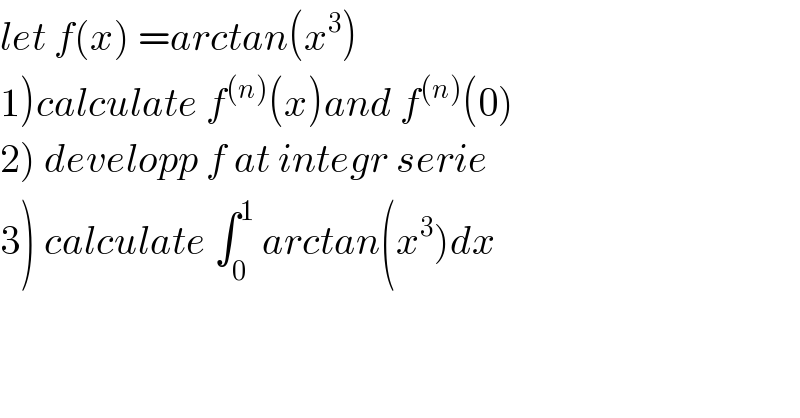Question Number 67187 by mathmax by abdo last updated on 23/Aug/19

$${let}\:{f}\left({x}\right)\:={arctan}\left({x}^{\mathrm{3}} \right) \\ $$$$\left.\mathrm{1}\right){calculate}\:{f}^{\left({n}\right)} \left({x}\right){and}\:{f}^{\left({n}\right)} \left(\mathrm{0}\right) \\ $$$$\left.\mathrm{2}\right)\:{developp}\:{f}\:{at}\:{integr}\:{serie} \\ $$$$\left.\mathrm{3}\right)\:{calculate}\:\int_{\mathrm{0}} ^{\mathrm{1}} \:{arctan}\left({x}^{\mathrm{3}} \right){dx} \\ $$
Commented by mathmax by abdo last updated on 28/Aug/19
![1) f(x) =arctan(x^3 ) ⇒f^′ (x) =((3x^2 )/(1+x^6 )) ⇒f^((n)) (x)=(((3x^2 )/(1+x^6 )))^((n−1)) let decompose inside C(x) F(x) =((3x^2 )/(x^6 +1)) z^6 +1 =0 ⇒z^6 =−1 =e^(i(2k+1)π) so if z=r e^(iθ) we get r=1 and 6θ =e^(i(2k+1)π) ⇒ θ =e^((i(2k+1)π)/6) so the poles of F are Z_k =e^((i(2k+1)π)/6) k∈[[0,5]] Z_0 =e^((iπ)/6) , Z_1 =e^(i(π/2)) =i Z_2 =e^((i5π)/6) , Z_3 = e^((i7π)/6) , Z_4 = e^((i9π)/6) , Z_5 = e^((i11π)/6) f^((n)) (x) =Σ_(k=0) ^(n−1) C_(n−1) ^k (3x^2 )^((k)) ((1/(x^6 +1)))^((n−1−k)) (leibniz) =3x^2 ×{(1/(x^6 +1))}^((n−1)) +(n−1)(6x){(1/(x^6 +1))}^((n−2)) +6 C_(n−1) ^2 {(1/(x^6 +1))}^((n−3)) let find {(1/(x^6 +1))}^((k)) with k from N wr have G(x) =(1/(x^6 +1)) =Σ_(i=0) ^5 (λ_i /(x−z_i )) λ_i =(1/(6z_i ^5 )) =−(1/6)z_i ⇒G(x) =−(1/6)Σ_(i=0) ^5 (z_i /(x−z_i )) ⇒ G^((k)) (x) =−(1/6)Σ_(i=0) ^5 z_i ×(((−1)^k k!)/((x−z_i )^(k+1) )) ⇒ G^((n−1)) (x) =−(1/6)Σ_(i=0) ^5 z_i ×(((−1)^(n−1) (n−1)!)/((x−z_i )^n )) G^((n−2)) (x) =−(1/6)Σ_(i=0) ^5 z_i × (((−1)^(n−2) (n−2)!)/((x−z_i )^(n−1) )) G^((n−3)) (x) =−(1/6)Σ_(i=0) ^5 z_i ×(((−1)^(n−3) (n−3)!)/((x−z_i )^(n−2) )) so the value of f^((n)) (x) is determined.](https://www.tinkutara.com/question/Q67560.png)
$$\left.\mathrm{1}\right)\:{f}\left({x}\right)\:={arctan}\left({x}^{\mathrm{3}} \right)\:\Rightarrow{f}^{'} \left({x}\right)\:=\frac{\mathrm{3}{x}^{\mathrm{2}} }{\mathrm{1}+{x}^{\mathrm{6}} }\:\Rightarrow{f}^{\left({n}\right)} \left({x}\right)=\left(\frac{\mathrm{3}{x}^{\mathrm{2}} }{\mathrm{1}+{x}^{\mathrm{6}} }\right)^{\left({n}−\mathrm{1}\right)} \\ $$$${let}\:{decompose}\:{inside}\:{C}\left({x}\right)\:{F}\left({x}\right)\:=\frac{\mathrm{3}{x}^{\mathrm{2}} }{{x}^{\mathrm{6}} \:+\mathrm{1}} \\ $$$${z}^{\mathrm{6}} \:+\mathrm{1}\:=\mathrm{0}\:\Rightarrow{z}^{\mathrm{6}} =−\mathrm{1}\:={e}^{{i}\left(\mathrm{2}{k}+\mathrm{1}\right)\pi} \:\:\:{so}\:{if}\:{z}={r}\:{e}^{{i}\theta} \:{we}\:{get}\:{r}=\mathrm{1}\:{and} \\ $$$$\mathrm{6}\theta\:={e}^{{i}\left(\mathrm{2}{k}+\mathrm{1}\right)\pi} \:\Rightarrow\:\theta\:={e}^{\frac{{i}\left(\mathrm{2}{k}+\mathrm{1}\right)\pi}{\mathrm{6}}} \:\:{so}\:{the}\:{poles}\:{of}\:{F}\:{are} \\ $$$${Z}_{{k}} ={e}^{\frac{{i}\left(\mathrm{2}{k}+\mathrm{1}\right)\pi}{\mathrm{6}}} \:\:\:\:{k}\in\left[\left[\mathrm{0},\mathrm{5}\right]\right]\:\:\:\:{Z}_{\mathrm{0}} ={e}^{\frac{{i}\pi}{\mathrm{6}}} \:\:,\:{Z}_{\mathrm{1}} ={e}^{{i}\frac{\pi}{\mathrm{2}}} \:={i} \\ $$$${Z}_{\mathrm{2}} ={e}^{\frac{{i}\mathrm{5}\pi}{\mathrm{6}}} \:\:,\:\:\:{Z}_{\mathrm{3}} =\:{e}^{\frac{{i}\mathrm{7}\pi}{\mathrm{6}}} \:,\:\:{Z}_{\mathrm{4}} =\:{e}^{\frac{{i}\mathrm{9}\pi}{\mathrm{6}}} \:\:\:,\:\:{Z}_{\mathrm{5}} =\:{e}^{\frac{{i}\mathrm{11}\pi}{\mathrm{6}}} \\ $$$${f}^{\left({n}\right)} \left({x}\right)\:=\sum_{{k}=\mathrm{0}} ^{{n}−\mathrm{1}} \:\:{C}_{{n}−\mathrm{1}} ^{{k}} \left(\mathrm{3}{x}^{\mathrm{2}} \right)^{\left({k}\right)} \left(\frac{\mathrm{1}}{{x}^{\mathrm{6}} +\mathrm{1}}\right)^{\left({n}−\mathrm{1}−{k}\right)} \:\:\:\left({leibniz}\right) \\ $$$$=\mathrm{3}{x}^{\mathrm{2}} ×\left\{\frac{\mathrm{1}}{{x}^{\mathrm{6}} \:+\mathrm{1}}\right\}^{\left({n}−\mathrm{1}\right)} \:+\left({n}−\mathrm{1}\right)\left(\mathrm{6}{x}\right)\left\{\frac{\mathrm{1}}{{x}^{\mathrm{6}} \:+\mathrm{1}}\right\}^{\left({n}−\mathrm{2}\right)} \\ $$$$+\mathrm{6}\:{C}_{{n}−\mathrm{1}} ^{\mathrm{2}} \:\:\:\left\{\frac{\mathrm{1}}{{x}^{\mathrm{6}} \:+\mathrm{1}}\right\}^{\left({n}−\mathrm{3}\right)} \:\:{let}\:{find}\:\left\{\frac{\mathrm{1}}{{x}^{\mathrm{6}} \:+\mathrm{1}}\right\}^{\left({k}\right)} \:\:{with}\:{k}\:{from}\:{N} \\ $$$${wr}\:{have}\:{G}\left({x}\right)\:=\frac{\mathrm{1}}{{x}^{\mathrm{6}} \:+\mathrm{1}}\:=\sum_{{i}=\mathrm{0}} ^{\mathrm{5}} \:\frac{\lambda_{{i}} }{{x}−{z}_{{i}} } \\ $$$$\lambda_{{i}} =\frac{\mathrm{1}}{\mathrm{6}{z}_{{i}} ^{\mathrm{5}} }\:=−\frac{\mathrm{1}}{\mathrm{6}}{z}_{{i}} \:\Rightarrow{G}\left({x}\right)\:=−\frac{\mathrm{1}}{\mathrm{6}}\sum_{{i}=\mathrm{0}} ^{\mathrm{5}} \:\frac{{z}_{{i}} }{{x}−{z}_{{i}} }\:\Rightarrow \\ $$$${G}^{\left({k}\right)} \left({x}\right)\:=−\frac{\mathrm{1}}{\mathrm{6}}\sum_{{i}=\mathrm{0}} ^{\mathrm{5}} {z}_{{i}} ×\frac{\left(−\mathrm{1}\right)^{{k}} {k}!}{\left({x}−{z}_{{i}} \right)^{{k}+\mathrm{1}} }\:\Rightarrow \\ $$$${G}^{\left({n}−\mathrm{1}\right)} \left({x}\right)\:=−\frac{\mathrm{1}}{\mathrm{6}}\sum_{{i}=\mathrm{0}} ^{\mathrm{5}} \:{z}_{{i}} \:×\frac{\left(−\mathrm{1}\right)^{{n}−\mathrm{1}} \left({n}−\mathrm{1}\right)!}{\left({x}−{z}_{{i}} \right)^{{n}} } \\ $$$${G}^{\left({n}−\mathrm{2}\right)} \left({x}\right)\:=−\frac{\mathrm{1}}{\mathrm{6}}\sum_{{i}=\mathrm{0}} ^{\mathrm{5}} \:{z}_{{i}} ×\:\frac{\left(−\mathrm{1}\right)^{{n}−\mathrm{2}} \left({n}−\mathrm{2}\right)!}{\left({x}−{z}_{{i}} \right)^{{n}−\mathrm{1}} } \\ $$$${G}^{\left({n}−\mathrm{3}\right)} \left({x}\right)\:=−\frac{\mathrm{1}}{\mathrm{6}}\sum_{{i}=\mathrm{0}} ^{\mathrm{5}} {z}_{{i}} \:×\frac{\left(−\mathrm{1}\right)^{{n}−\mathrm{3}} \left({n}−\mathrm{3}\right)!}{\left({x}−{z}_{{i}} \right)^{{n}−\mathrm{2}} }\:\:{so}\:{the}\:{value}\:{of} \\ $$$${f}^{\left({n}\right)} \left({x}\right)\:{is}\:{determined}. \\ $$
